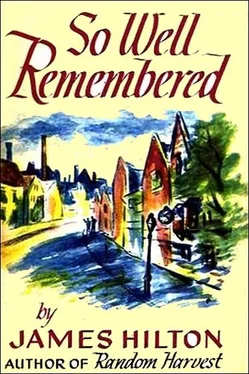Джеймс Хилтон - So Well Remembered
Здесь есть возможность читать онлайн «Джеймс Хилтон - So Well Remembered» весь текст электронной книги совершенно бесплатно (целиком полную версию без сокращений). В некоторых случаях можно слушать аудио, скачать через торрент в формате fb2 и присутствует краткое содержание. Год выпуска: 1945, Жанр: Проза, на английском языке. Описание произведения, (предисловие) а так же отзывы посетителей доступны на портале библиотеки ЛибКат.
- Название:So Well Remembered
- Автор:
- Жанр:
- Год:1945
- ISBN:нет данных
- Рейтинг книги:5 / 5. Голосов: 1
-
Избранное:Добавить в избранное
- Отзывы:
-
Ваша оценка:
- 100
- 1
- 2
- 3
- 4
- 5
So Well Remembered: краткое содержание, описание и аннотация
Предлагаем к чтению аннотацию, описание, краткое содержание или предисловие (зависит от того, что написал сам автор книги «So Well Remembered»). Если вы не нашли необходимую информацию о книге — напишите в комментариях, мы постараемся отыскать её.
So Well Remembered — читать онлайн бесплатно полную книгу (весь текст) целиком
Ниже представлен текст книги, разбитый по страницам. Система сохранения места последней прочитанной страницы, позволяет с удобством читать онлайн бесплатно книгу «So Well Remembered», без необходимости каждый раз заново искать на чём Вы остановились. Поставьте закладку, и сможете в любой момент перейти на страницу, на которой закончили чтение.
Интервал:
Закладка:
“That is the home I was born in, Martin—not as happy as it might have been, but not as unhappy either. So I don’t complain of it, but I do want to make YOURS happier. Which is why I intend soon to begin putting books in your way, because the more freely and vividly you see things while you are young, even if you can’t fully understand them, the more actively they will possess you when you grow up—especially if, in adult life, you have hard battles to fight and bitter disappointments to face. New worlds, Martin, are for the young to explore; later one is glad of a new room, or even of a view from a new window…”
He put aside the fragment then, thinking he would add to it on many succeeding nights, but he never did; perhaps the rare mood never recurred.
As the post-war slump deepened and unemployment filled the street corners with lounging, workless men, George encountered new opposition to his Mill Street housing scheme. Many of the cotton mills were closing down completely; some of them went bankrupt as catastrophically as had Channing’s a generation before, but without the criminal taint, though the short-lived boom had been pushed by speculators to limits that were almost criminal.
Among the mills that closed was the one still called Channing’s, though long operated by another firm; now, when George walked down Mill Street, the mill loomed up, symbolically as well as actually, at the dead end of the street. Derelict, like Stoneclough five miles away, it stood for the dead end of what the Channings themselves had stood for. Still physically intact, with machines inside that could spin and weave, nobody would buy it or use it, because nobody wanted what it could do. Yet the illusion that it still had some real value was preserved; it was regularly taxed and insured; the Browdley police kept an eye on it, the fire department were ready to quench the blaze should any lightning or arsonist strike. But neither did, though lightning had once, when George was a boy, struck the Methodist chapel at the other end of the street.
The chapel also stood, a little less forlorn than the mill— derelict, one might say, only six days out of the seven. For Methodism in Browdley, like the cotton trade, was not what it had been. People could not afford to give so much to their chapels, nor were there so many Methodists. George, walking along the street where he was born and which he planned to rebuild for others to be born in, remembered those early days when both mill and chapel had flourished, and when his own father, sharing the week between them in that mystic proportion of six to one, and with his house half-way between, had served a life-sentence longer though less stigmatized than that of his boss.
The reason George visited the Mill Street area so often was not a sentimental one. Indeed, it was concerned with drains rather than dreams; for the more graphically he could report to the Council how bad the houses were and what disease-traps they had become, the sooner he hoped to get his scheme actually started.
He found a powerful ally in Dr. Swift, Browdley’s medical officer, who had himself issued many warnings. After a long struggle and against the bitter opposition of a few of the town’s old- established doctors, a system of free immunization against diphtheria had been set up, enabling parents to have their children inoculated at a municipal clinic. It was, however, impossible to make this compulsory, and the whole question became impregnated with political and even religious prejudices that George deplored and perhaps at the same time aggravated by his own constant argument that it was not enough to immunize; the CAUSES of epidemics should be tackled, and the chief was bad housing. To which the opposition retorted that George was using the health issue for his own political ends, that Browdley was in no greater danger than other manufacturing towns, and that though the Mill Street area was somewhat less salubrious than the rest, what could be done about it when local tax rates were almost the highest in the country? And since the opposition, fighting on this tax issue, had won seats at recent Council by-elections, George found his slum- clearance project losing rather than gaining ground for the time being.
He often walked with Dr. Swift through the worst of the streets, the medical officer supplying scientific ammunition for George’s continuing struggle on the Council. For George would not give in; there was a point, even though at times it was hard to find, beyond which he would not even waver or compromise. Indeed, his mere mention of Mill Street had begun to send a smile or a sigh across the Council Chamber, so well was the subject now recognized as the bee in George’s bonnet. But he did not mind. “Sooner or later I’ll wear ‘em down,” he assured Swift, to which the latter replied grimly: “Better be sooner.”
For it had been a hot summer. Towards the end of September over twenty diphtheria cases appeared in and around Mill Street, mostly among young children, of whom five quickly died.
In such an emergency Dr. Swift was given command almost without restrictions; everything remedial was promptly organized—the quarantining of families, wholesale inoculations, closing of schools, and so on. The Council had adjourned for its four weeks’ annual recess; many councillors were still on holiday. But George, who had the Guardian to look after and could not afford a holiday, was right on the spot to say ‘I told you so’ to any former opponents he might meet. They were not so much his opponents now. They all agreed, in principle, that something would have to be done about the Mill Street area. And most agreed, in principle, with the Guardian editorial in which George wrote:
“We must learn our lesson from this tragic visitation. Though the epidemic has now (according to the latest assurance of our eminent and indefatigable Medical Officer, Dr. Swift) been checked, we can never again feel secure until preventable disease has been ABOLISHED AT ITS SOURCE. Let those citizens who live in the more fortunate parts of Browdley and whose children have remained unscathed, bear in mind the joint responsibility of us all for what we allow to happen anywhere in our town, and let them do their share, and PAY their share, in making Browdley safe for our children’s future.”
The only adverse comment George got about this was from a new Catholic priest, Father Harry Wendover, of St. Patrick’s, who questioned the phrase “what we allow to happen in our town”. Having been introduced to George at a meeting, he immediately buttonholed him with the query: “Isn’t that a bit arrogant, Mr. Boswell? After all, even if you don’t believe in the hand of God, you might at least recognize that there are limits to what the hand of Man can do.”
George noted the newcomer’s tall gaunt frame and deep-socketed eyes, the strong chin and the cultured accent, and decided that here was a man to be both respected and tackled. Rumour had already informed him that Wendover was something of the proud cleric, so George answered, giving as well as taking measure: “Aye, there are limits, I daresay, but in Browdley we’re still a few thousand miles away from ‘em. And as for the hand of God, what makes you think I don’t believe in it?”
Wendover smiled—a rather pleasant smile. “To be frank—just gossip. That’s all a priest has to go by when he comes to a new place and wants to find out who’s who.”
“So they gossip about me, do they?” And immediately George was thinking about Livia and what sort of gossip might still be circulated about her.
“Oh, nothing malicious. In fact, you seem to be extremely popular. But they also say that you’re not a God-fearing man like your father, that you don’t often go to church or chapel, and that you’re on good terms with atheists and agnostics.”
Читать дальшеИнтервал:
Закладка:
Похожие книги на «So Well Remembered»
Представляем Вашему вниманию похожие книги на «So Well Remembered» списком для выбора. Мы отобрали схожую по названию и смыслу литературу в надежде предоставить читателям больше вариантов отыскать новые, интересные, ещё непрочитанные произведения.
Обсуждение, отзывы о книге «So Well Remembered» и просто собственные мнения читателей. Оставьте ваши комментарии, напишите, что Вы думаете о произведении, его смысле или главных героях. Укажите что конкретно понравилось, а что нет, и почему Вы так считаете.










